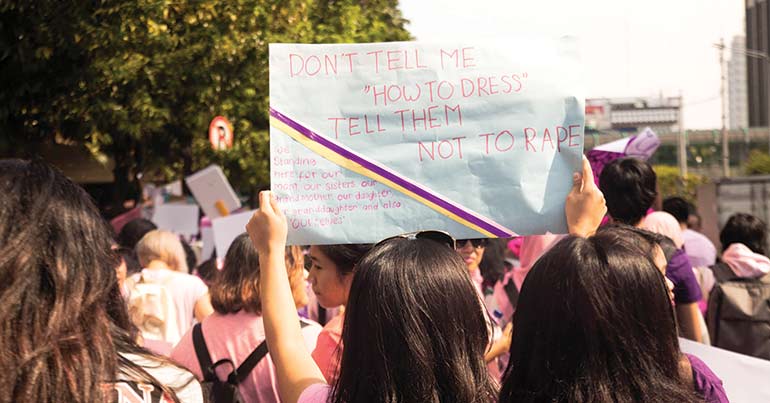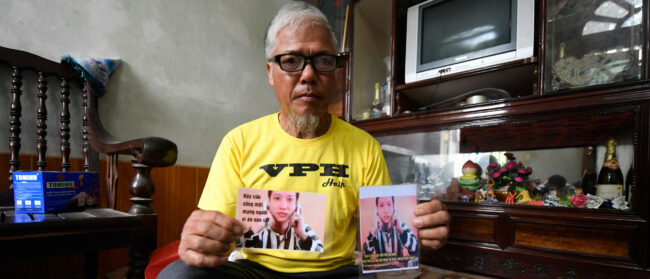Indonesian social media works fast. In October 2017, the alleged sex tapes of a former University of Indonesia (UI) student were shared on messaging apps. Reportedly uploaded by her former boyfriend, the videos spread quickly across the archipelago, leading to a heated discussion in the media on pornography, morality and revenge porn. The headlines revelled in screaming “UI alumni becomes a pornstar!” and “Exciting intimate video from UI student goes viral!”
The young woman denied it was her, but her identity had already been published on gossip sites and in newspapers. Internet searches for her name will forever throw up links to the videos, tarnishing her reputation.
Indonesia is one of the world’s largest consumers of pornography. A 2013 study from the universities of Copenhagen and Surabaya found that more than 92% of Indonesian men had watched pornography in the 12 months prior. This is despite strict government-run internet censorship and increasing Islamic conservatism.
Revenge porn, too, is a phenomenon on the rise in Indonesia. It involves the sharing of nude photographs or videos and is often perpetrated by ex-lovers to get revenge on women. Sometimes, the material was taken with consent; sometimes, the women had no idea their partners had naked photos of them.
“Perpetrators don’t really understand the full scale of the social impact,” said Sophia Hage, founder of Lentera Sintas Indonesia, an NGO that provides psychological support to survivors of sexual violence. “They know it will have an impact [on their victims], otherwise they wouldn’t do it. But to what extent, I don’t think they fully understand. Their motivation varies, but most do it out of hate – it’s an act of ‘getting even’.”
Most worryingly, Indonesian law permits the prosecution of people appearing nude or even semi-clothed in photos or videos. The 2008 Pornography Law states that anyone involved in the development or distribution of pornographic material (pornografi) or something called pornoaksi can be charged and punished with up to 15 years of jail time. What constitutes pornoaksi is deliberately left undefined, leaving authorities able to crack down on ‘indecent’ actions, such as in 2017 when the law was used to charge gay men for performing as go-go dancers at clubs in Jakarta. Not even popstars can escape it – Nazril ‘Ariel’ Ilham, the singer in band Peterpan, was sentenced to three years in jail in 2011 after his sex tape was circulated online.
“The men sometimes do this [spread revenge porn] so that the women get caught up in the law and will be charged as taking part in making pornographic videos,” said Siti Lestari of the Women’s Legal Aid Foundation in Jakarta. This makes the women “ashamed, scared and uncomfortable… so many of our clients don’t want to report it [to the police]. Not to mention the legal process is very long.”

Indonesian women targeted by revenge porn say it has a significant negative impact on their lives. Mentally, they report a crisis of self-confidence, with many becoming introverted and preferring to spend time alone. Socially, they have lost friends and become targets of hatred and bullying; family members have all but disowned them; some have even lost jobs or been expelled from university. The impact can be so significant that some victims told Southeast Asia Globe that they divide their lives into two parts: before and after the incident.
“My job offer was withdrawn,” said Ana*, who had been living overseas and returned to Indonesia to work on a political campaign. The politician’s wife and colleagues saw the photos Ana’s ex-boyfriend had uploaded on Facebook, and the politician suddenly ceased returning Ana’s calls and emails. “He simply stopped talking to me,” she said.
Ana didn’t want to go to the police, because she knew they wouldn’t do anything about it. Not to mention that talking to her family about what had happened “wasn’t ever an option”.
“Do you know how that would affect my family?” Ana asked, her eyes glassy as we sat in a café in central Jakarta. “Religion views sex as sinful. My family are very involved in the church, and my sister is a teacher.”
Rika’s* experience was similar – when her family saw the nude photos of her that her ex-boyfriend had uploaded to Facebook, she was forced to lie and tell them they were Photoshopped. “I was scared of being judged,” Rika said, saying that her family would view her differently if they found out she was no longer a virgin, especially as they didn’t even know she had been dating someone.
“My family is not open-minded,” Rika explained. “My sisters in particular… They wouldn’t be able to believe that their own sister had done what I did [had sex before marriage].”
The precarious legal situation of those caught up in revenge porn also meant that Rika never thought about reporting the incident.
“The police [are] supposed to be neutral, but they judge victims of rape, of assault, that sort of thing, and it would be too traumatic for me to go through that,” she said. “I seriously considered reporting it once but then never thought about it again.” The fact that the Pornography Law could result in her being criminalised was too much after everything she had already been through, she said, especially as she would have to come clean that it really was her in the photos.
“We shared intimate photos for our private collections. He wanted me to stay with him, so he threatened to share my photographs.”
Fauziah
Premarital sex is common throughout Indonesia, yet it is widely considered taboo. Religion is a major factor in this, particularly with the country’s majority religion being Islam, which views all sexual activity outside of marriage as zina or immoral. Zina is a terrifying concept to many; a huge sin that cannot be forgiven. An increasing number of Indonesians even advise young people to marry early rather than risk zina – in late October, Southeast Asia Globe sat in on a court session in which a judge gave permission for a 15-year-old girl to marry so that she could avoid zina (the girl was already sexually active with her boyfriend).
“Sex is still considered taboo [in Indonesia],” Hage said. “Especially for women. By engaging in premarital sex, they are considered immoral, cheap, naughty. This adds to the complexity of how sex in a relationship is perceived by the male counterpart. It can be used as a ‘weapon’ to intimidate, to control, to manipulate and even to hurt the women in the relationship.”
Perpetrators of revenge porn often do it in an attempt to force their partner to stay in the relationship, but some do it for money or to extort more nude photos. Jakarta’s Women’s Legal Aid Foundation assisted four cases of sex-related extortion in 2015, but Lestari believes many more go unreported. “Some go to the police, but many of our clients don’t want to do so,” she said. “They are ashamed, scared and uncomfortable.”
Revenge porn is by no means restricted to tech-savvy Jakarta, either. Fauziah* lives in Aceh, the only province in Indonesia to implement a form of sharia law. Fauziah and her boyfriend dated for three years before she tried to break up with him because he had begun to be violent towards her. He was furious and threatened to spread naked photos of her if she insisted on separating.
“We shared intimate photos for our private collections,” Fauziah explained via Twitter. “He wanted me to stay with him, so he threatened to share my photographs. But I threatened him back. He was the only person who had those photos, so I told him if they emerged in public, the legal impact would be huge for him. He had a background in law, so he reconsidered [whether to spread the photos].
“As I live in Aceh the bullying would have been much worse. I was also still at university at the time; I probably would have been kicked out… Not to mention how my family would have reacted,” Fauziah said.

“Once a woman is publicly identified with a sex tape or photos, she becomes fair game.”
Hera Diani, Magdalene magazine
Hera Diani, founder and editor of Magdalene, an online magazine that explores issues around sex and gender in Indonesia, agrees that it is extremely hard for Indonesian women to recover from invasions of privacy such as revenge porn. “Indonesian culture is very patriarchal and very unforgiving when it comes to women and sexuality,” she explained. “Once a woman is publicly identified with a sex tape or photos, she becomes fair game. She will be blamed [for what happened] and people will say it is her fault for having sex.”
Fauziah and Ana are still traumatised by what happened to them, but both are learning to deal with it. “I pretended to be OK so my ex-boyfriend didn’t think I was weak,” Fauziah said. “But now, I refuse point blank to document any sexual activities with my new boyfriend. It’s enough to simply experience and remember them.”
Unfortunately, it is not as easy as Fauziah makes it sound. Taking and sharing photos, including nude ones, is becoming a common part of many women’s sexual lives. This is partly because more women are happily embracing and celebrating their sexuality, but also because men often pressure their partners into it. It’s a piece of the broader issue of men not understanding the importance of sexual consent, especially as taking and sending nude photos is a sexual act. For many men, successfully encouraging their partners to share naked photos makes them feel powerful and in control, just as it does if they masturbate in front of women (comedian Louis CK), expose their genitals to women (director Harvey Weinstein), or make repeated unwanted sexual advances on women (late Fox News CEO Roger Ailes).
Ana has been able to move on from the trauma of what happened to her, despite admitting she has never told the story to anyone but Southeast Asia Globe. “I was a prude before,” she said, laughing. “But after this, I can wear whatever I like; people can see my skin in the pictures anyway. It may sound crazy, but it’s actually not the end of the world… In a way, he gave me my freedom.”
*Names have been changed to protect victims from potential prosecution and further embarrassment.


